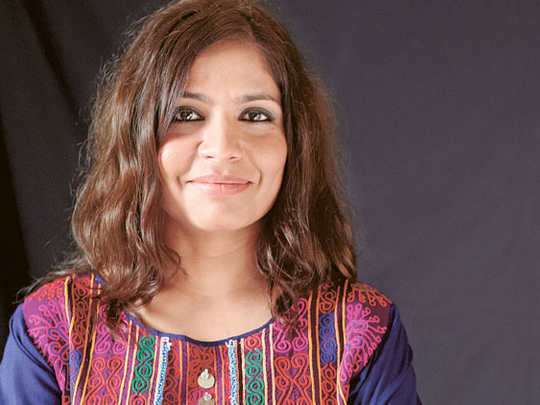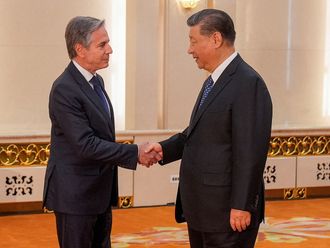
Sheerenjan was only 9 years old when she was given away by her family in Afghanistan to settle a dispute.
She didn't know. One day her mother gave her a new salwar kameez and asked her to get ready to go to a wedding with her grandmother. Yet at the event there was no celebration of the kind with food and music as is normally the custom.
Sheerenjan had been given away as part of an age-old Afghan custom used to settle disputes, called dukhmany. Her new family kept her in a room with animals. Men, women and children in the household would take turns beating her day and night.
It turned out Sheerenjan's father had killed one of their family members and this was their way of exacting revenge. She lived on scraps of food left by dogs. One day her mother visited her and when she saw how weak Sheerenjan had become, she went home and vomited blood. Due to the distress her mother lost the 5-month-old baby she was carrying.
Sheerenjan's story is one of about a dozen powerful tales featured in a new book, Dear Zari: Hidden Stories From Women of Afghanistan, by Zarghuna Kargar. The stories are taken from a BBC radio programme called Afghan Woman's Hour, which ran from 2004 to 2010 and for which Kargar worked as presenter and producer.
I am sitting with the writer in a café inside the office of her publishers, Random House, located in Vauxhall, London. We are drinking tea. Kargar looks cheerful and enthusiastic as she tells me about her own childhood growing up in Afghanistan.
Unlike a lot of the women in her book, she comes from a privileged background. Born in Kabul in 1982 into a family of four girls, she grew up in a secure and popular part of Kabul called Macrorail.
Her father was the minister for national radio, and later minister for printing during the Soviet occupation of the country in the 1980s. As a result, her family had the opportunity to make acquaintance with a lot of celebrities.
At that time Afghanistan was a more liberal society. "Sometimes we had parties organised in our house and popular Afghan singers would come to our house," Kargar says.
"I remember showing off to the neighbourhood girls all these singers such as Seema Tarana were coming to my house. I loved her as a child. She used to come to our house and sometimes I went to hers with my mum. I enjoyed meeting her and watching her on TV. It was a privilege for me to know such popular singers."
Her school was Russian-built, where mostly children of government ministers went to study. Then one day in 1989 an incident happened which left a deep scar on Kargar's life. The security situation in the capital had been getting worse day by day.
The Soviet Union was getting weak and the mujahideen were firing rockets almost every day. One day one such rocket landed near her school yard. There was black smoke and dust everywhere. Kargar looked down and saw one of her classmates lying unconscious with her clothes soaked in blood. She was dead.
"It was a horrible incident," she says. "It affected me psychologically. I was scared all the time of losing people close to me and losing my own life." Kargar was shattered and couldn't cope with being around her friends after that and began to isolate herself. She didn't attend classes for several weeks.
Some of her schoolfriends started calling her dewana, which means "mad" in Dari. Her father sent her to one of the best doctors in Kabul, where she had ECT treatment and began to recover, although she would suffer severe migraines and have bad dreams long after.
A few years later, after the Soviets had left and the situation deteriorated, the family moved to Peshawar in Pakistan. "I wanted to be a singer," she says. "But for an Afghan woman to be a singer is not easy. Our life changed when war happened."
Peshawar was a more conservative city than Kabul, and Zarghuna and her sisters felt compelled to cover up with the hijab. Her family's circumstances had changed and they were not as well off as before. She attended a school for refugees funded by Saudi Arabia and later went to university to study journalism.
Then the Pakistani government stopped all higher education for Afghan refugees and many couldn't finish their studies. Luckily the BBC World Service Trust had decided to hold a five-day training workshop for young people keen to be journalists.
They invited Kargar along with a few of her classmates to the BBC office, where they were shown how to record and find material to broadcast. With so many Afghan refugees, Peshawar then was full of stories for a journalist. The BBC did a voice test and offered her work on a freelance basis.
The first report Kargar made for the BBC was about a mother with many children living in a refugee camp and wanted information on contraceptive methods. With the help of more experienced colleagues, Kargar interviewed a doctor who offered advice.
"I was so happy," she recalls. "I thought I had done a great job. In my opinion it was good because I had managed to get an interview with a woman who was sharing her stories with me. However, it was not of the standard I would have liked it to be now."
In 1999 she applied for a job with the BBC World Service for an education programme for children. During that time the Taliban was in power in Afghanistan and many girls were not allowed to go to school.
The BBC ran a project called REACH to give radio education to Afghan children. So Kargar worked with refugee children, going to camps and bringing in their stories. Then in August 2001 she moved to London.
Her father had already got political asylum there and he invited them on a family reunion visa. Not long afterwards, September 11 happened and Afghanistan was in the headlines everywhere. So Kargar — fluent in both Dari and Pashto — found her skills in demand at the BBC, which was expanding its transmission in Afghanistan.
In mid-2004 the BBC World Service Trust decided to do a woman's radio show in Afghanistan. Kargar had to work on the project from scratch alongside an experienced journalist from BBC Woman's Hour. It was a feature programme which went on air every Monday and was repeated twice in the week. It was recorded in the two main Afghan languages of Dari and Pashto — 25 minutes each.
Over time they were able to hire women living in different provinces of Afghanistan who would go out and interview other women. By 2006, according to a survey, the Afghan Woman's Hour had become the second most-listened-to programme across Afghanistan. Interestingly, the majority of the listener feedback was from men, although a lot of women listened too.
While outside observers often see Afghanistan as a society where religion plays a prominent role, one of the main issues Kargar came across during her work with the Afghan Woman's Hour was the lack of Islamic knowledge. She believes a lot could improve with better religious education.
"Many people across Afghanistan still believe that whatever they do traditionally — if they marry a young girl at the age of 9 or 12 without her consent and all these kinds of issues — is their religious duty," she says.
"It's not — it's wrong. We know as Muslims that every nikah is done with the acceptance of both sides. If they don't accept there is no nikah — in my opinion that is what Islam tells us. But this information is very limited to people in Afghanistan and the people who give religious information mix tradition with it. I believe as an Afghan woman that these traditions are in favour of men. They are made by men for the interest of men. Women suffer as a result."
An example of this conflict is illustrated in the book in the story of a woman called Janpary. She was given away by her gambling brother as a second wife to another man to pay off his debt. She becomes a widow after her husband is killed and lives her life struggling to feed her four children.
Refusing to beg on the streets, she desperately searches for work. Eventually she finds a maid's job at a bungalow in Jalalabad. Her mistress turns out to be a caring woman who informs her of her Islamic right to a share in her parent's inheritance, which had all gone to her brother.
She then takes on the courage to confront her selfish brother to get her share. He is shocked and angry by his sister's audacity and an ugly confrontation follows. "I know from what I have studied in the Quran and discussed with religious experts in the programme that inheritance is given to [both] girls and boys in Islam," Kargar says. "No one in Islam denies that. But people think you are committing a sin if you ask for your share of inheritance from your brother or any male member in the family."
As for Sheerenjan, the girl who was given away to settle a family dispute, Kargar first met her in the outskirts of Kabul for Afghan Woman's Hour in 2006. By then she was about 70 years old and had a grown-up son from a husband in the same family that used to beat her.
But now in old age there were no more beatings as her tormentors were either dead or had moved out long ago. What happened to her was more than 50 years ago. Yet the practise of giving away young girls to settle disputes continues to this day. "In villages all over Afghanistan it is very common," Kargar explains.
In fact, the same year she met Sheerenjan a child was given away from among Kargar's own relations. "I found out that the daughter of my first cousin, Pana, was given away by her grandad to settle a family dispute in Pakistan," she says. "She was 11. My heart was crying for her but I couldn't do anything because I cannot change that tradition. I couldn't help with money, I couldn't help with anything. And she was gone like Shereenjan in 2006 with no wedding. That is why it touched me personally." Last year young Pana died in childbirth.
The programme was discontinued in 2010 after the Foreign Office cut its funding. Since then there has been demand from listeners to get the show back on air. However, the issue of Afghan women's rights has become a controversial one in recent times, with some even attempting to link female emancipation and Western intervention in the country.
Certainly, not everyone will approve of the kind of stories Kargar has chosen to narrate in her book. "Some people might think I am portraying Afghan women as victims and the traditions as bad," she says. "But I don't think there is such a thing as good and bad. These are truths and facts that have happened and I am talking about them."
But are Afghan women victims? "In the sense of what they face or how much choice they have to deal with things, maybe they are," Kargar says. "But in terms of their resilience, strength and belief in having a good future for their daughter, for the next generation, I think they are not. They are the strongest women I have ever met in my life."
Female bonding
Zarghuna Kargar was born in Kabul in 1982. After Soviet troops forced out the government — in which her father was minister for information — and civil war erupted across Afghanistan, she and her family sought refuge in Pakistan.
Kargar completed her education in Peshawar: She studied at a refugee university and attended a journalism course organised by the BBC. Then in 2001 her family sought asylum in the United Kingdom, and she started working for the BBC World Service Pashto section.
She joined the team on the ground-breaking programme ‘Afghan Woman's Hour' as producer and presenter in 2004, until it was discontinued in 2010. She now works on current affairs programmes for the BBC Afghan Service, frequently covering topics related to women's issues. She lives in London.
Information courtesy: www.randomhouse.com
Syed Hamad Ali is a writer based in Cambridge, UK.












